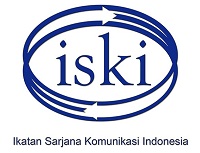Pengaruh Etos Pimpinan terhadap Motif Berprestasi Kerja Karyawan
Abstract
Keywords
Full Text:
PDF (Bahasa Indonesia)References
Al-Rasyid, Harun. 1988. Teknik Sampling, Lembaga Penelitian dan Pengabdian Kepada Masyarakat (LPPM-IKOPIN). Bandung.
Applbaum, Ronald L. Dan Karl W.E. Anatol. 1974. Strategy for Persuasive Communication, Columbia, Ohio: Charles E. Merrill Publishing Company.
Calhoun, James F. Dan Joan Ross Acocella. 1990. Psychology of Adjustment And Human Relationship. Terjemahan R.S. Satmoko. 1995. Edisi ketiga, Semarang: IKIP Semarang Press.
Davis, Keith dan John W. Newstrom. 1985. Human Behaviour at Work: Organizational Behaviour. Terjemahan Agus Dharma. 1993. Perilaku dalam Organisasi. Edisi ketujuh. Jilid 2. Jakarta: Erlangga.
Devito, Joseph A. 1989. The Interpersonal Communication Book. New York: Harper and Row Publisher.
Dwivedi, R.S. 1979. Human Relations and Organizational Behaviour. New Delhi: Mohan Primlani.
Effendy, Onong Uchjana. 1984. Human Relations dan Public Relations dalam Management. Bandung: Alumni.
ffendy, Onong Uchjana. 1992. Kepemimpinan dan Komunikasi. Bandung: Mandar Maju.
Gobel, Frank G. 1971. The Third Force, The Psychology of Abraham
Maslow. Terjemahan A. Supratinya. 1987. Mazhab Ketiga Psikologi
Humannistik Abraham Maslow. Yogyakarta: Kanisius.
Goss, Blaine. 1983. Communication In Everyday Life. Belmont: Wadsworth.
Haris, Nasruddin, dkk. 1997. Telekomunikasi Indonesia: Sejarah, Perkembangan dan Proyeksi ke Depan. Bandung: PT Telkom dan Yayasan Ikatan Alumni Lemhanas.
Halloran, Jack. 1978. Applied Human Relations an Organizational Approach. New Delhi: Printice-Hall of India.
Higgins, James M. 1982. Human Relations Concept and Skill. New York: Random House.
Koontz, Harold, Cyril O’Donnell, Heinz Weihrich. 1984. Management. Terjemahan Antarikso, dkk. 1996. Jakarta: Erlangga.
Kurniadi, Oji. 2000. Pengaruh Komunikasi Keluarga Terhadap Prestasi Belajar Anak SMU Negeri di Kotamadya Bandung. Tesis Magister Sains, Program Pascasarjana Universitas Padjadjaran Bandung.
Liliweri, Alo. 1994. Perspektif Teoritis Komunikasi Antarpribadi: Suatu Pendekatan ke Arah Psikologi Sosial Komunikasi. Bandung: Citra Aditya Bakti.
Liliweri, Alo. 1997. Komunikasi Antarpribadi. Bandung: Citra Aditya Bakti.
McClelland, David C. 1961. The Achieving Society.Terjemahan Siswo Suyanto dan Wihelmus W. Bakowatun. Memicu Masyarakat Berprestasi. Jakarta: Intermedia.
Muhammad, Arni. 1995. Komunikasi Organisasi. Jakarta: Bumi Aksara.
Pace, R. Wayne. 1983. Organizational Communication: Foundation for Human Resource Development. New Jersey: Printice-Hall.
Pace, R. Wayne, Don F. Faules. 1993. Komunikasi Organisasi: Strategi Meningkatkan Kinerja Perusahaan. Terjemahan Deddy Mulyana,
Engkus Kuswarno, dan Gembirasari, 1998. Bandung: Remaja Rosdakarya.
Rakhmat, Jalaluddin. 1985. Psikologi Komunikasi. Bandung: Remadja Karya.
Rakhmat, Jalaluddin. 1989. Metode Penelitian Komunikasi. Bandung: Remadja Karya.
Sukmadinata, Nana Syaodih. 1983. Kontribusi Konsep Mengajar dan Motif Berprestasi terhadap Proses Mengajar dan Hasil Belajar. Disertasi, Pascasarjana IKIP Bandung."
DOI: https://doi.org/10.29313/mediator.v9i2.1119
Refbacks
- There are currently no refbacks.

This work is licensed under a Creative Commons Attribution 4.0 International License























